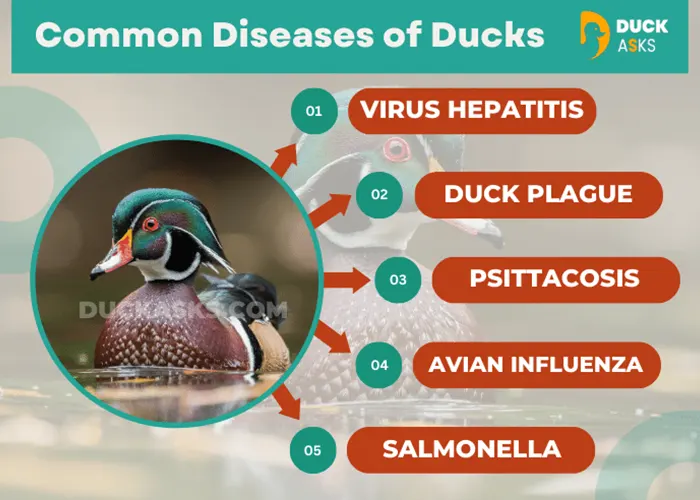Do Ducks Have Rabies?
Ducks, like other birds, can spread a few diseases to humans. Rabies is a deadly animal disease that can infect humans as well. Due to this, many new duck owners ask a question which is, do ducks have rabies as well?
The answer is no; ducks don’t have rabies. It is a viral disease that affects only mammals and doesn’t affect birds. Rabies is a deadly virus; there is no clinical treatment, and rabies-infected animals end up dying.
Now, if you’re interested to know more about rabies itself and some other disease the duck can face, check this guide out.
Related article about duck diseases:
Why Does Rabies Only Affect Mammals?
Rabies hates the cold. Mammals are warm-blooded creatures. On top of warm blood, they have fur as well.

Thus, they’re the ideal preference for rabies (due to their temperature). However, rabies doesn’t affect snakes or birds since they aren’t mammals.
But rabies affects bats, though. Bats are considered to be mammals, and they’re warm-blooded as well. And they cause rabies in 7 out of 10 human beings in America on average.
Is It Possible to Get Rabies from a Duck?
As mentioned earlier, rabies affects mammals only. Ducks aren’t mammals; they’re birds. So, they can’t give you rabies.
Ducks don’t get affected by rabies in the first place. However, there’s a rare possibility that it can trigger the risk.

93% of rabies are found in wild animals. If you feed wild animals to your ducks (it’s neither usual nor traditional), they’ll get infected.
Consequently, they might end up giving you rabies as well. This is why experts highly recommend not feeding wild animals to ducks.
Most Common Diseases That Ducks Contain?
Though ducks don’t contain or spread rabies, they can spread some life-taking diseases. Let’s get to know some of the most common ones.

Virus Hepatitis
It’s an extremely contagious disease that can be fatal. However, adult ducks are safe from this virus as it only affects young ducklings aged between 1 – 28 days. As ducklings grow, they become resistant to this virus.
Hepatitis spreads very fast and is usually transmitted through the flock. Symptoms of virus hepatitis are –
- Ducklings will not be able to walk or move properly.
- Will become lethargic and paddle spasmodically.
- Ducklings will usually die within an hour after showing the two symptoms.
Duck Plague
It’s another highly contagious disease that affects both mature and young ducks. However, it’s seen less in young ducks. There are many symptoms of this disease; the most common ones are:
- Diarrhea: Watery droppings, the color will become greenish-yellow. The droppings might have blood stains sometimes.
- Blood-stained feathers: Plague-infected ducks often show ruffled feathers, and feathers around the vest will be stained with blood.
Apart from these, in some cases, the duck might drip blood from the nostrils.
Psittacosis
This one can affect both humans and ducks. A bacteria named Chlamydia psittaci is what causes Psittacosis. Usually, this bacteria is found in duck feces and saliva.
The symptoms of Psittacosis in ducks are weight loss, ruffled feathers, and lethargy. And symptoms in humans are headache, fever, pneumonia, and chills.
Psittacosis, if left untreated, can cause some serious complications. It’s normally treated using antibiotics.
Avian Influenza
It’s a viral infection which is also known as bird flu. Ducks are susceptible to this virus, and it spreads pretty fast. The most common symptoms of avian influenza are weight loss, increased water intake, and decreased food intake. Ducks may develop some respiratory infections as well, such as pneumonia.
Though avian influenza is rare in humans, it’d be wise to be careful when handling ducks though.
Salmonella
When ducks eat contaminated foods and water, they get infected with Salmonella. It can be spread to humans as well via droppings and duck feathers. The most common symptoms of Salmonella are lethargy, weight loss, dehydration, and diarrhea.
Symptoms of Rabies in Animals
After entering the body, this virus travels to the brain through nerves. And then animals start to show various symptoms. Although different animals show different symptoms, here are the most common ones.

Domestic cows, horses, etc., might become extremely sensitive to light when they’re hit by rabies. Wild animals that usually are afraid of humans may experience change in behavior.
The ones that usually would stay hidden from humans might end up attacking humans. Animals that used to come out only at night might come out in the daytime.
Wrapping
Rabies is a deadly disease, and there is no clinical treatment for this. Therefore, make sure that you keep your animals vaccinated and away from all kinds of wild animals.
Not only that but ensure you or any other family member don’t go near any animal that acts weird. But do ducks have rabies? You know the answer already.
If you do see something strange on your ducks that may seem rabies-like to you, it shouldn’t be rabies. Contact your vet for the details in such cases.
Image Credit: Canva.com/photos
Article Reference:
- Cdc.gov/rabiesandkids/animals.html
- Healthtap.com/q/is-it-possible-to-get-rabies-from-a-duck/
- Humanesociety.org/resources/understanding-rabies
- Avma.org/resources-tools/one-health/help-control-rabies/rabies-and-your-pet






